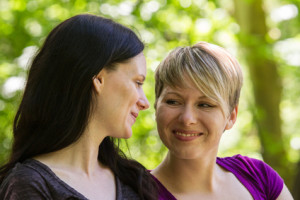
Contributed by JourneyPure, The Standard in Addiction Treatment.
In the distance, there are the familiar sounds of raised voices—two, maybe three. They are arguing…"No—wait—please. I just want to talk!" Then…"Just leave me alone—you don't know anything—I don't want to talk about it!" Followed by the inevitable slamming of the door…silence…and the muffled cries of the one left behind.
There is no single, tried-and-true method to starting a conversation with someone caught up in the throes of addiction. What you can bank on is that you are not alone, and it is time to start talking about addiction.
Just keep in mind, when confronted, a person with an addiction may react negatively, even with hostility, if they perceive you are judging them "negatively."[1] Also, contrary to what many believe, addiction/mental health problems do not all stem from the parents.[2]
Knowing the Facts About Addiction
It is important to arm yourself with information. This will provide a measure of self-confidence as you approach the individual. Having facts will also re-enforce the reasoning behind your desire to talk about addiction.
- In 2015, over 50,000 deaths were attributed to drug overdose.[3]
- Recent statistics reflect approximately 91 U.S. citizens die every day, from an opioid-related overdose.[4]
- Approximately 15 million people in the U.S. abuse prescription drugs.[5]
- On average, over 650,000 prescriptions of opioids are dispensed daily in the U.S.[6]
 Also, it is crucial to understand what happens with the brain after repeated drug use; it literally changes, basically remaps, the brain, particularly the areas of the brain that provide individual self-control.
Also, it is crucial to understand what happens with the brain after repeated drug use; it literally changes, basically remaps, the brain, particularly the areas of the brain that provide individual self-control.
The changes in the brain can cause the person to truly believe they need the drug more than eating or sleeping.
This is also why an addicted individual's behavior can change so dramatically—from responsible, loving, and considerate to lying, stealing, angry, and hurtful.[7]
Clinical Director of the Professional Women's Program & Equine Therapy, Dr. Tamara Roth, PhD, LPC/MHSP offers this vital information regarding some of the Do's and Don'ts when starting a conversation with someone about addiction:
DO:
- Be compassionate. Realize that your loved one has not chosen to be an addict, and they are probably as scared as you (even if they don’t show it).
- Use “I” statements. For example: “I feel scared when you…” this can help prevent them from being overly defensive.
- Consider seeing a professional counselor to help you talk through your fears and concerns.
- Attend Al-Anon meetings. Finding other people who are further along the path can be a great source of support.
- Be willing to look at your own issues and how you may be contributing to the pattern.
DON'T:
- Take it personally.
- Shame, blame or, belittle your loved one.
- Try to control your loved one.
- Enable their behavior. Learn the difference between being supportive and enabling.
- Wait to get help. If you think there is a problem, there most likely is. Addicts are great at minimizing and justifying their use.
Countless times, experts in the field of Addiction Therapy express the need to seek out professional guidance for anyone who is worried that their loved one is struggling with addiction.
Professionals in the field are trained at determining the signs and symptoms of addiction, and they can be of great assistance in determining the reality of the situation. Your conversation will be held in the utmost of confidence.[8]
It could be that the best action to take, rather than trying to talk one-on-one with a friend or loved one struggling with addiction, is to perform an intervention. Though this may feel like you are taking drastic action, it also provides a level of support beyond one-on-one contact.
Again, before taking this step, it is essential to speak with a professional before attempting an intervention on your own.[9]
Addiction doesn't happen in a vacuum; it affects every aspect of an addict's life from parents, siblings, and children to friends and work relationships. Too often family and friends put off talking to their loved one about their addiction and behavior out of dread.
 The expectation of a confrontation, the anger, and the lashing-out is a worthy deterrent, even for those with the strongest of constitutions. Still, the problem will not just simply go away; nor is it likely to magically heal itself.
The expectation of a confrontation, the anger, and the lashing-out is a worthy deterrent, even for those with the strongest of constitutions. Still, the problem will not just simply go away; nor is it likely to magically heal itself.
What is more likely to take place is a continued process of detrimental behavior, perpetuated by the family and other loved one's desire to protect the very individual who is caught up in the web of addiction.[10]
Don't wait. It's time to talk about addiction.
About JourneyPure: The mission of the JourneyPure family of treatment facilities is to assist each patient in recovery from addictive behaviors, substance use and co-occurring mental health disorders by utilizing a truly integrated treatment model. With exceptional clinical services, JourneyPure provides a full continuum of care focused on relapse prevention and long-term recovery.
 About the Author: Brenda Walker, MHA. Ms. Walker holds a Master of Arts Degree in Health Care Administration from Ashford University and a Bachelor of Science Degree in Health Care Management from Anthem College. She has worked for over two decades in the healthcare field in many capacities, and she is a published author who is well respected among her peers in both the publishing community and in the healthcare arena. Her primary focus remains in mental health, advocacy, and the strategic planning of health care policy.
About the Author: Brenda Walker, MHA. Ms. Walker holds a Master of Arts Degree in Health Care Administration from Ashford University and a Bachelor of Science Degree in Health Care Management from Anthem College. She has worked for over two decades in the healthcare field in many capacities, and she is a published author who is well respected among her peers in both the publishing community and in the healthcare arena. Her primary focus remains in mental health, advocacy, and the strategic planning of health care policy.
Currently, Ms. Walker works with some of the finest and most prestigious minds at JourneyPure developing knowledge-based content intended to inform both consumers and industry professionals.
References:
[1] Bartlett, R., Brown, L., Shattell, M., Wright, T., & Lewallen, L. (2013). Harm Reduction: Compassionate Care of Persons with Addictions. Retrieved April 13, 2017, from https://www.ncbi.nlm.nih.gov/pmc/articles/PMC4070513/
2] MacMaster, Samuel A. (2006). A Stress-Coping Model for Conceptualizing the Impact of Substance Abuse on Families, Stress, Trauma, and Crisis: An International Journal, 9:2, 119-137, DOI: 10.1080/15434610500406327.
[3] Overdose Death Rates. (2017, January 06). National Institute on Drug Abuse. Retrieved April 13, 2017, from https://www.drugabuse.gov/related-topics/trends-statistics/overdose-death-rates
[4] Understanding the Epidemic. (2016, December 16). Retrieved April 13, 2017, from https://www.cdc.gov/drugoverdose/epidemic/
[5] Prescription Drug Misuse and Abuse. (2015, October 28) SAMSHSA. Retrieved April 13, 2017 from https://www.samhsa.gov/prescription-drug-misuse-abuse
[6] The Opioid Epidemic: By the Numbers. (2016, June). Retrieved April 13, 2017, from https://www.hhs.gov/sites/default/files/Factsheet-opioids-061516.pdf
[7] What is Addiction? (2017, January 18). Retrieved April 13, 2017, from https://easyread.drugabuse.gov/content/what-addiction
[8] Living with an addict? Helping loved ones struggling with addiction. (2017, March 15). Retrieved April 13, 2017, from https://journeypureriver.com/how-to-help-a-loved-one-that-is-struggling-with-addiction/
[9] Intervention - Alcohol & Drug Rehab Nashville TN. (n.d.). Retrieved April 13, 2017, from https://journeypureriver.com/family-resources/intervention
[10] https://journeypureriver.com/family-dynamics-addiction/
The opinions and views of our guest contributors are shared to provide a broad perspective of addictions. These are not necessarily the views of Addiction Hope, but an effort to offer discussion of various issues by different concerned individuals.
We at Addiction Hope understand that addictions result from a combination of environmental and genetic factors. If you or a loved one are suffering from an addiction, please know that there is hope for you, and seek immediate professional help.
Published on May 19, 2017.
Reviewed By: Jacquelyn Ekern, MS, LPC on May 19, 2017.
Published on AddictionHope.com
